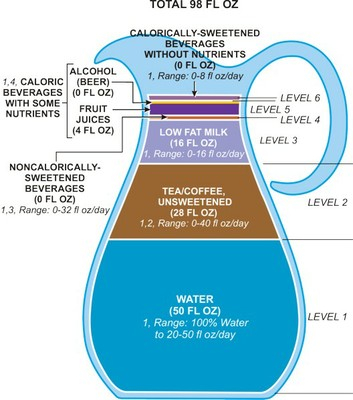Beverage Panel Recommendations and Analysis
The Beverage Guidance Panel provides, in a review published in the American Journal of Clinical Nutrition, a detailed summary of the health benefits and costs of each beverage.
The panel comprises: Barry M. Popkin, Lawrence Armstrong, George M. Bray, Benjamin Caballero, Balz Frei, and Walter C. Willett.
Based on this review and our knowledge of health and nutrition, the panel recommends the following intake ranges for beverages. Click on the beverage category below to read a health review for that level.
- Level 6: Calorie-rich beverages without nutrients, such as carbonated soft drinks
(up to one 8-oz. serving, less if trying to lose weight) - Level 5: 100% fruit and vegetable juices, whole milk, sports drinks
(up to one 8-oz. serving) - Level 4: Diet beverages with sugar substitutes
(up to four 8-oz. servings) - Level 3: Nonfat or low-fat milk and fortified soy beverages
(up to two 8-oz. servings) - Level 2: Unsweetened coffee and tea — iced and hot
(up to eight 8-oz. servings a day of tea, up to four 8-oz. servings of coffee) - Level 1: Water
(at least four 8-oz. servings for women, at least six 8-oz. servings for men)

(10% of energy from beverages) for a Person with
a 2200 kcal Energy Requirement per Day
NOTE: Figure adapted with permission, The American Journal of Clinical Nutrition, American Society for Nutrition.
Footnote: The values of 50, 28, 16, and 4 fluid ounces are shown for illustrative purposes only; the total should be 98 fluid ounces.
- This value is the Panel’s suggested range for each beverage.
- Caffeine is a limiting factor up to 400 mg/day or about 32 fl. oz./day for coffee or about 64 fl. oz./day for tea (either can replace water).
- Tea can be substituted for coffee with respect to caffeine limitations.
- The Panel’s suggested limits are: 100% fruit juices 0 to 8 fl. oz./day, alcoholic beverages 0 to 1 drink per day for women and 0 to 2 drinks per day for men, and whole milk 0 fl. oz./day.
